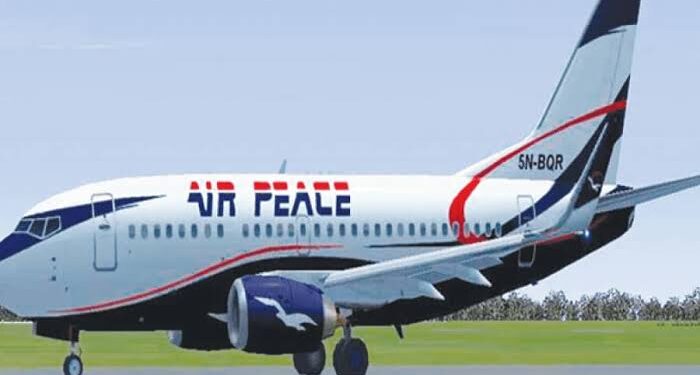The Nigerian Safety Investigation Bureau (NSIB) preliminary report released has indicted three crew members of Air Peace of alcohol consumption and cannabis substances after the incident recorded at the Port Harcourt International Airport (PHIA), Omagwa.
The report, released on Friday by the NSIB, claimed that initial toxicological tests conducted on the flight crew revealed positive results for certain substances, including indicators of alcohol consumption.
To avert a reoccurrence, the agency said it has issued immediate safety recommendations for Air Peace Limited to strengthen its Crew Resource Management (CRM) training, particularly in handling unstabilised approaches and go-around decisions.
However, in response, Air Peace claimed that it was unaware of the safety recommendations by the NSIB, adding that the first officer had been reinstated into active flying duties, with full approval from the Nigeria Civil Aviation Authority (NCAA).
The report, signed by Director, Public Affairs and Family Assistance, NSIB, Mrs. Bimbo Oladeji, said that a cabin crew member also tested positive for Tetrahydrocannabinol (THC), the psychoactive component in cannabis.
Tetrahydrocannabinol is a primary psychoactive compound in cannabis responsible for the high or euphoric feeling associated with marijuana use.
The aircraft, Boeing 737-524 with the registration number 5N-BQQ, had overshot the runway on landing at the airport.
The aircraft departed from the Murtala Muhammed Airport (MMA), Lagos, with 96 passengers and seven crew members onboard, totalling 103.
The detailed report, seen on the website of the NSIB, indicated that conditions in Port Harcourt were good, with clear skies, calm weather and daylight visibility before the incident.
According to the report, the aircraft was stable on approach until it got close to landing.
“At 1,000 feet above the ground the situation appeared normal, and the captain disconnected the autopilot at 500 feet to complete the landing manually. Shortly after, the aircraft drifted above the normal landing path,” the report read in part.
The report revealed that the captain admitted during interrogation that by the time he realised it, the aircraft was already too high and crossed the runway threshold at about 200ft, which is much higher than the recommended landing height.
The report further showed that the first officer had advised the captain to go around and attempt another landing.
NSIB described the advice as a standard safety procedure in aviation, but the captain with over 10,000 hours on the Boeing 737 decided to continue with the landing.
NSIB said the decision of the captain to continue with the landing led to the aircraft touching down almost three quarters of the way down the 3,000-metre runway, leaving very little space to slow down.
It said the aircraft rolled for almost another kilometre before overshooting the runway and stopping on the grass.
NSIB stated that after the incident, the crew underwent toxicology tests, which confirmed high alcoholic consumption on both pilots, while one of the flight attendants tested positive for cannabis.
“The aircraft, operating as a scheduled domestic flight from Lagos to Port Harcourt with 103 persons on board, landed long on Runway 21 after an unstabilised final approach.
“The aircraft touched down 2,264 metres from the runway threshold and came to a final stop 209 metres into the clearway. All passengers and crew disembarked safely, and no injuries were reported,” the report added.
NSIB said the results were being reviewed under the human performance and safety management components of the investigation.
It recommended to the Air Peace to reinforce internal procedures for crew fitness-for-duty monitoring before flight dispatch.
NSIB said the preliminary report represented early findings and was subject to further analysis, adding that the final report would present detailed conclusions and additional recommendations to enhance aviation safety in Nigeria.
However, Air Peace, in a statement on Friday, said it was yet to receive any official communications from the NSIB on such findings over a month after the incident.
The airline insisted that it placed utmost priority on safety, transparency, and compliance, adding that it conducts frequent alcohol and drug tests on its crew.
Air Peace maintained that its alcohol use policy is stricter than the recognised eight hours before the flight as provided in the regulations.
According to the airline, the captain of the affected flight was immediately grounded and relieved from further flight duty till date for failure to adhere to CRM principles and for disregarding standard go-around procedures as advised by his co-pilot.
The statement also hinted that the co-pilot, who demonstrated professionalism in calling for a go-around to his captain, had been reinstated into active flying duties with the approval of the NCAA.
The airline said if the co-pilot was involved in drug or alcohol use, the NCAA would not have cleared him to resume flight duties.
“However, if the relieved captain tested positive to the breathalyser test, then we must increase the frequency of our alcohol and drug tests on our crew.
“Again, the importance of Enhanced Crew Resource Management Training cannot be over emphasised. We will intensify strict fitness-for-duty checks and stronger internal monitoring to prevent any breach of our zero-tolerance safety policy,” the statement added.



































